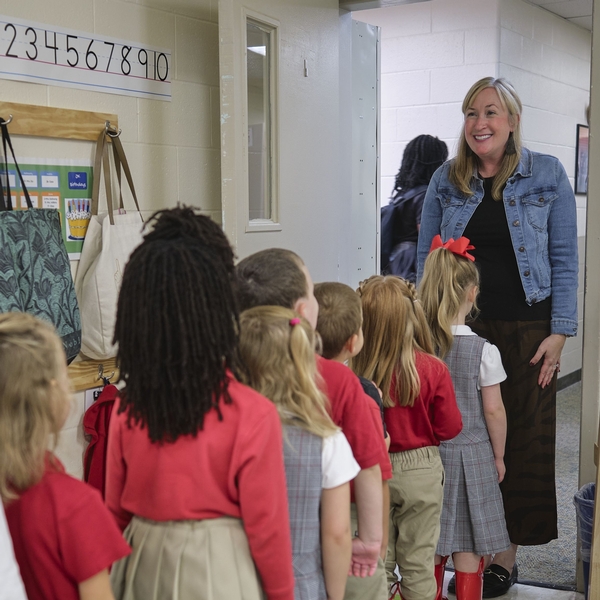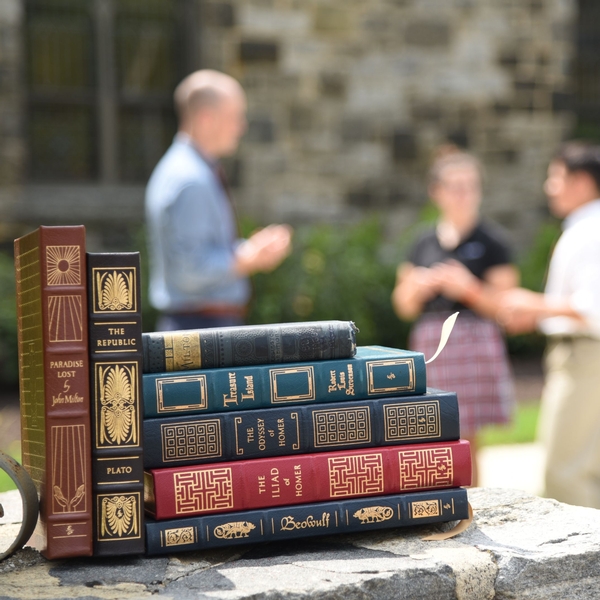Rockbridge Academy Blog
Learning Our Lines

On a recent trip to my local bookshop, I noticed James Clear’s hugely popular, Atomic Habits, on a table near the front of the store. The 2018 bestseller now has a companion workbook. I was tempted to buy both. I am sure many others did. Because, one thing most of us know intuitively, is that small choices repeated over time—habits—lead to what becomes the way we live our lives, and reflects, ultimately, what we value.
This got me to thinking about walking in lines. More specifically, it got me thinking about why we spend so much time and effort here at Rockbridge teaching grammar students to walk in lines. Without a good understanding of why this one simple habit has value, one could begin to think it is a bit restrictive, a little too military-like, even harsh. I mean, what is the big deal if the line is a little wiggly, ziggy-zaggy, and jumpy as long as everyone makes it safely back to class and in good time?
I am glad you asked, because recently I had a group of students with just such a line. Initially, I was tempted to chalk it up to too much sugar and Christmas excitement. It wasn’t until another teacher called out my students as she walked by, that I caught up with the class and addressed their behavior. In that moment, I felt the Holy Spirit reminding me, why this one, simple activity is so important. I will share with you what I shared with the class.
While lines may be restrictive and military-like, they are an especially wonderful opportunity for spiritual formation. Our infinitely wise God has allowed our sanctification to be gradual. While our justification and salvation are complete already, sanctification takes time. Walking in line is a means of sanctification that develops obedience and humility, trust, and love for others. Let me explain.
As the student, I line up first because my teacher tells me to. There are many things God tells me to do, too. And though I want to be the line leader (always), accepting my spot in line helps me learn to be second, or third, or fifteenth, and thus helps me to consider others better than myself. This surely takes practice.
Lining up also teaches me how to trust others. Instead of tilting my head sideways to look ahead, I keep my eyes on the classmate in front of me, accepting that he is doing the same, as is every other classmate right up to the line leader. In my life as a Christian, I need to trust fellow believers, to rely on them, and they on me. I am even called to it.
Lastly, walking in line helps me learn how to love. When I remain in line, I learn to respect others space, to make room for them. I learn, too, that part of God’s love for me is in providing order and limits. I imitate God’s order by keeping an orderly line. In this, I am reflecting, and respecting, His character.
So the next time you are walking the halls here at school and you see grammar students walking in line, take encouragement that while they may not be practicing atomic habits, they are learning eternal ones.
Photo Credit: John Daly
Melanie Kaiss has taught PE at Rockbridge Academy since 2004. She began teaching when her oldest child was in second grade. All four of her children have since graduated from Rockbridge (Classes of 2015, 2016, 2018, and 2024). Over the last 21 years, Melanie has taught PE at every grade level, been assistant to the Athletic Director, coached girls soccer and lacrosse, and run numerous Discovery Summer camps for five years running. Melanie’s husband, Stephen, joined the Rockbridge board shortly after she began teaching. He became a permanent board member and continues to serve today.
Why Liberal Arts?

As the world grows increasingly more dependent on computers, AI, and STEM professions, the value of a well-rounded human has been forgotten by many. In STEM fields, college classes especially place the emphasis on cramming more math or science knowledge into the students’ brains, but they do not take the cultivation of the whole person into account. A liberal arts education, on the other hand, covers all fields: the humanities, social sciences, natural sciences, and arts. This form of learning equips the students with a diverse skillset. Historically, it has been composed of the trivium (grammar, dialectic, and rhetoric) and the quadrivium (geometry, arithmetic, astronomy, and music). They nurtured and cultivated the mind and spirit to understand and know. Despite many high schools and colleges discrediting the worth of a liberal arts education by not embracing them, it is still an important form of education for people in all professions. Even in my first semester in college, I’ve encountered students who are clearly brilliant, but lack the ability to interact with a historical text or carry on a deep discussion simply because they haven’t been taught that way. In any major, whether it be STEM or not, a well-rounded student needs a liberal arts education.
Even from a young age, a liberal arts education trains a student’s mind to question, interpret, and understand. By definition, it focuses on critical thinking, communication skills, and a well-rounded understanding of various fields. Once a student is equipped with tools of interpretation and critical thinking, it allows him to analyze and correctly judge the world around him more easily. If there’s a basis for how to think, it becomes easier to evaluate for ourselves what to think. It prepares a student for a life of learning and education. When applied correctly, these are skills that can be honed your entire life.
Not only does it train the mind how to think, but a liberal arts education also prepares a student for a STEM job better than a purely STEM education would. In the workforce, an employer does not just look at your GPA or your transcript, but also who you are. If you are a one-dimensional professional who only mainly understands math or science, you have a limited range of options in the workforce. However, if you can grasp the STEM concept, but also know how to communicate clearly and think on your feet, you are a much more valuable employee. Simply put, it opens a broader range of jobs. A typical science class at a non-liberal arts school gives you formulas, equations, and hands-on experience. The students greatly benefit from these classes, but schools often over emphasize the benefits of these classes, neglecting an important part of the education for what they believe is most important. Being well-spoken, articulate, and well-rounded are all benefits in a STEM field, and not necessarily something that a science class would teach.
Lastly, studying literature, rhetoric, and social sciences allows students to attain a holistic education. Every time you learn a new concept, it fits into the framework of knowledge that has already been created. This allows you to understand one subject in terms of another and make previously unseen connections, subsequently deepening your understanding of the world and God’s creation. A deeper understanding can in turn foster creativity and ingenuity in your chosen field, whether it be STEM or not. Further, if you feel like God is calling you to a different major or a different vocation than before, you don’t have to start from scratch because you already have a strong foundation and a broad education.
Liberal arts skills are basic, essential skills that everyone in every profession should learn, understand, and apply. Even in college, it is vital that you continue your liberal arts education. Learning about the humanities or how to express your thoughts concisely and clearly should not stop once you finish high school; rather, it becomes more important once you enter college or the workforce. In basic daily life, a well-rounded education allows individuals to meet the demands of a complex world, whether it be pitching a business idea, talking to a stranger, or solving a difficult engineering problem.
It is also important to recognize that a liberal arts education does not neglect the sciences. They are still an important part of the education system. Instead, it enhances the sciences. Math and science can provide us with scientific realities about the world, but they do not answer the metaphysical questions of why. Especially from a Christian perspective, studying philosophy, art, literature, and history allows us to ask and answer these questions. A liberal arts education provides an excellent, well-rounded framework that prepares you for life.
Julia Farr is a Rockbridge Academy Alumna, class of '25, studying Communications at Grove City College in Grove City, Pennsylvania.
